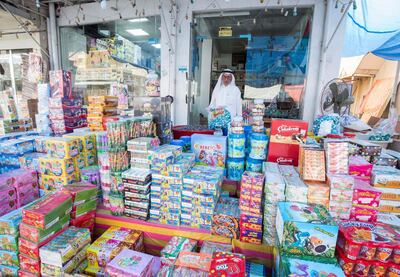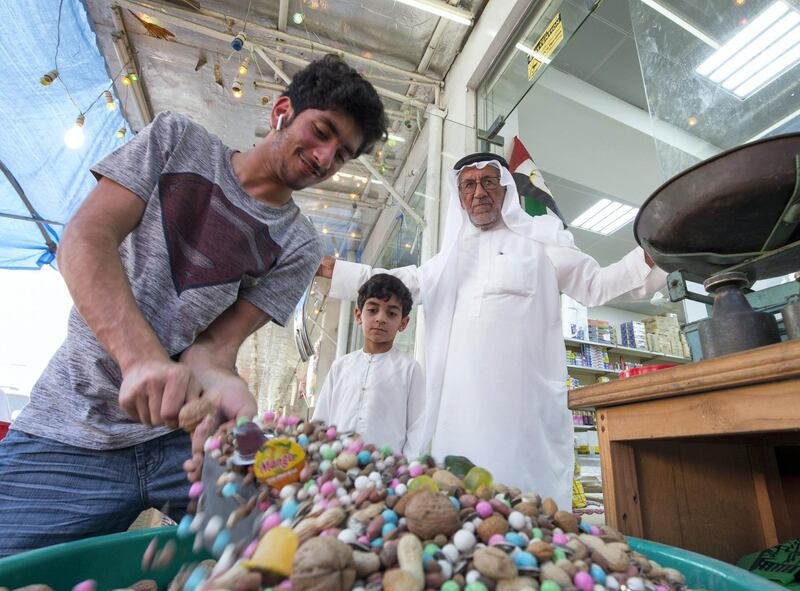Abdulla Ali walked through the back alleyways of the souq and unlocked a metal door. “Come, come,” he said, pushing himself through tight spaces between tottering stacks of cardboard boxes. “Look, this is all chocolates and candies. This is Haq Al Laila.”
Haq Al Laila is the Gulf celebration where children go door-to-door wearing traditional dress and singing for nuts and sweets. The holiday is celebrated every year on the 15th of Shaaban, the month of the Islamic lunar calendar preceding Ramadan. It is such an event that souq merchants count days by the Islamic calendar and nuts are not measured by kilograms or pounds but by ma’an, the Persian measurement equivalent to about 4kg.
Emirati and Iranian merchants of old souqs, like Mr Ali, the owner of the Islamic Trading Est in Ras al Khaimah, are guardians of the tradition. Demand is such that he had two small storehouses to keep the sweets that will be handed out to children across the country this evening as the moon rises on the 15th of Shaaban.

In the old days, children walked through alleyways under the light of the full moon. Nowadays, due to urban sprawl, Haq Al Laila is more commonly celebrated in classrooms and Government offices. In all but the most traditional neighbourhoods, children are driven from door-to-door.
“Houses have been changed,” said Abdulla Al Zaabi, 45, a Haq Al Laila shopper from RAK. “Before, all the houses were together. Now we’re using cars. Before you could feel the atmosphere and you knew your neighbours.”
One thing has not changed – people still buy their celebratory gifts from the Iranian market. Grocers have worked around the clock this week, with some bringing in Dh30,000 daily through the sales of nuts and sweets.
Mr Al Zaabi went to the souq with his daughters to buy kilograms of nuts and sweets for his neighbours. Shopping elsewhere was out of the question, he said, “some things we cannot find in places like Carrefour, or anywhere else."
In the old days, children got nothing but nuts and, if they were very lucky, a cold drink.

"People had very few things and gave children drinks like Vimto," said Mr Ali, an 80-year-old Emirati. "Before it was simple, not like nowadays. I'd buy five or six cartons of treats, that's all. Today I buy stock worth Dh200,000. I mean, I don't do this for profit. I do it because it's a tradition we've had from the old days and we do it every year."
Nowadays, the treats are often toffees and chocolates. “But everything we do today, it’s rooted in the past. See? See these chocolates?” he said, rummaging through his boxes. “Oh no wait, those are lollipops.”
Tarps are unfurled in the main street of the souq ten days before Haq Al Laila. Bins of nuts and towering boxes of crisps fill the street. It is the first sign of Ramadan. The traditional atmosphere attracts buyers from Abu Dhabi, Dubai and Sharjah, although goods are sourced from Dubai. “All of this is imported from Dubai for Dubai is the mother of the Gulf,” said Mr Ali. “But they don’t have the same atmosphere at the souq in Dubai. Each souq has its own atmosphere.”
_____________
Read more on life in RAK's Old Town:
RAK ice-cream sellers keep their cool in 10-year turf war
Sleepy Ras Al Khaimah is reinvigorated with a shot of karak
The man who flew over the creek and other Ras Al Khaimah gems
_____________
Young merchants drip with sweat as they shovel out sweets in the late April heat but it was no trouble for Mr Ali, whose disdain of air conditioning has made him accustomed to work outside. Like many of his generation, he attributes his fortitude to a diet of grilled rabbitfish, dates and Ras Al Khaimah goats that graze on mountains. This, he explained, is why despite his age he can still be found at his shop every morning at 7.30am.
“There’s blessing in movement,” he said. “I have never loved any work except this work. If I didn’t work, I wouldn’t live.”
The 15th of Shaaban is said to have special significance. Some believe it is the night that people began to pray towards Mecca instead of Jerusalem.
Others believe it predates Islam. Variations of Haq Al Laila are celebrated in Iran and South Asia. In the upper Gulf, it is celebrated mid-Ramadan and known as Gerga'an, while in Oman it is called Qaranqasho. Wherever it is found, the singing of children and banging of drums under the moonlight brings neighbourhoods together.
As streets fill with children’s laughter and singing tonight, the Iranian market will grow quiet once again.






